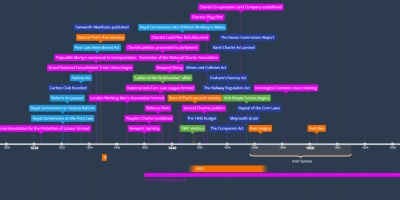1 Feb 1832 Jahr - Royal Commission on the Poor Law
Beschreibung:
The Poor Laws weren't a complete failure but were very inconsistent. They worked in some areas but not others - definitely not in industrial areas. Each parish was responsible for looking after its own poor and was allowed to charge householders a special sum of money: poor rate to look after the poor. This was just for poor people born in the parish. Helped the unemployed, people whose businesses had failed, the ill, the elderly, those suffering from mental health problems, orphans and single mothers.Rapid population growth and high bread prices meant the money spent on the poor was increasing significantly which put a considerable burden on the local rate payers especially when trade was bad and unemployment rose.
People saw the system as rewarding people for being poor when poverty was seen as a sin. It lowered the self-respect of workers who had to ask for this 'outdoor relief'. People were forced from their parishes of birth seeking work meaning, if needed, they wouldn't be able to ask for 'outdoor relief'.
Parishes also set up workhouses.
The commission employed 26 assistant commissioers
Zugefügt zum Band der Zeit:
Datum:
1 Feb 1832 Jahr
Jetzt
~ 193 years ago
